The cost of tuning a piano can vary widely depending on the condition, the area in which you live, and the specific expertise of the piano tuner. The average cost in the United States ranges from $50 to $200 per tuning. However, a piano that hasn’t been tuned for a long time may require additional maintenance or repairs, which could increase the overall cost.
Please note that the costs can increase if a piano requires repairs or multiple training sessions. Piano tuning is rare, and not everyone can handle the job. Hence, hiring a skilled and experienced professional is best, even if you have to pay a bit more.

Factors that Affect Piano Tuning Costs
Location
Piano tuning prices tend to be higher in urban areas or regions with a high cost of living. For instance, in a large metropolitan area, the cost could range from $150-$250, while in smaller towns or rural areas, the prices might be lower, around $100-$150. This reflects local economic factors like wage levels and transportation costs.
Condition of the Piano
If a piano is regularly maintained and tuned, it will likely fall in the typical tuning range of $100-$200. However, if the piano hasn’t been tuned for a while or is in poor condition, it may need a pitch adjustment or repair, which could add $50-$100 or more to the standard tuning cost.
Pitch Raise or Lowering
The piano may need a pitch raise or lowering if it is significantly out of tune. This process can add another $50-$100 to the standard tuning cost as it requires additional time and expertise.
Expertise of the Tuner
The experience and certification of the tuner can also influence the cost. A highly skilled or certified piano tuner may charge $200-$300 or more for tuning, while less experienced tuners might charge around $100-$150.
Additional Services
Other services like repairs, regulating, voicing, or cleaning could add from $50 to several hundred dollars to the total cost, depending on the complexity and time needed for these tasks.
Travel Time
Some tuners may add a travel surcharge if your location is far from their base of operations. Depending on distance and travel time, this could be an additional $20-$50 or more.
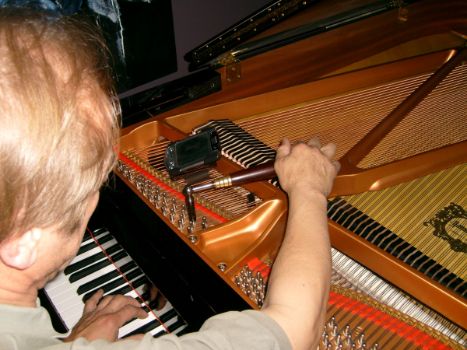
Piano Tuning Costs: Hourly vs. Flat Rate
Hourly Rate
Piano tuners who charge by the hour will base their fee on their time working on your piano. This can be beneficial if your piano only needs a minor adjustment and can be tuned quickly. However, the cost can add up quickly if your piano is in poor condition and requires extensive tuning or other services. The hourly rate typically varies between $60 to $125 per hour.
Flat Rate
Many piano tuners charge a flat rate for standard tuning. This means you pay one set price no matter how long the tuning takes. This can be advantageous as you know the cost upfront, and it won’t increase if the job takes longer than expected. However, this flat rate usually applies only to standard tuning, and additional services or repairs are often billed separately. The flat rate for piano tuning can vary but is generally between $100 and $200.
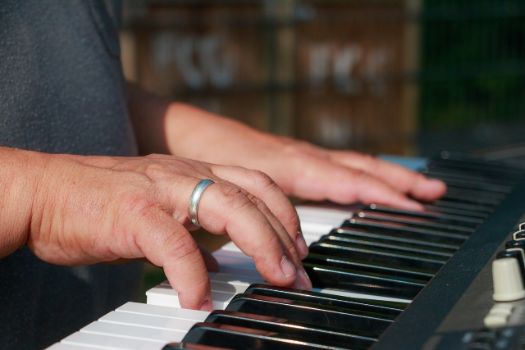
Costs of Other Piano Services
- Pitch correction: $60
- Repairs: $65 per hour
- Voicing: $175-$600
- Grand action reconditioning and regulation: $2,500-$3,500
- Vertical action reconditioning and regulation: $800-$2,500
- Soundboard cleaning: $100-$150
- Climate control installation: $450-$800
- Installation of under-covers: $250-$350
- String cover installation: $250-$350
- Grand action rebuilding: $5,000-$8,000
- Vertical action rebuilding: $4,000
- Evaluations: $100-$250
Piano Tuning Basics
Tuning a piano is a detailed process that involves adjusting the tension of each of the piano’s strings to the correct pitch. The piano tuner starts by using a tuning lever to adjust the tension of the strings. They’ll typically start with the middle octave, also known as the temperament octave, and tune the A4 note to a standard pitch, usually 440 Hz. They will then tune the rest of the temperament octave in relation to that A4.
Once the middle octave is tuned, the tuner extends the tuning to the bass and treble sections, using the tuned middle octave as a reference. They listen carefully to the beats and harmonics produced by the strings to ensure they are in harmony. This process requires a keen musical ear, experience, and expertise. It’s important to remember that tuning a piano involves the science of sound and the art of producing a beautiful tone.
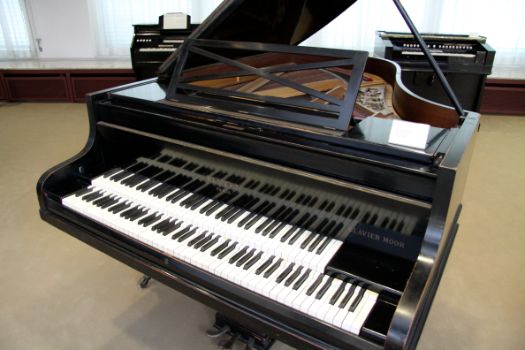
Signs that Your Piano Needs Tuning
- Out of Tune: If your piano sounds off, with notes not harmonizing as they should, it likely needs a tune-up. Even untrained ears often notice when something sounds wrong.
- Sticking Keys: If keys on the piano stick when pressed or don’t produce a sound, this could indicate a need for tuning and other maintenance.
- Inconsistent Sound: If the same note sounds different when played at different volumes or the sound quality seems to change abruptly, your piano may need tuning.
- Frequent Use: If your piano is used regularly or for professional purposes like teaching or performance, it will likely need more frequent tuning.
- Extended Period Since Last Tune: If it’s been more than six months to a year since your piano was last tuned, it probably needs tuning. Pianos typically need at least one or two tunings per year.
- Changes in Environment: If the piano has been moved, or if the humidity in its environment has changed significantly (like from winter to summer), it may need a tune-up. Both can cause the piano to go out of tune.

Importance of Piano Tuning
Regular piano tuning is essential to maintain the instrument’s proper functioning and sound quality. Over time, a piano’s strings can stretch and lose tension, leading to a change in pitch and potentially compromising the overall sound. This shift is natural but can be exacerbated by factors such as changes in temperature or humidity, heavy usage, or moving the instrument. Keeping a piano well-tuned ensures that it delivers the best possible sound and functions optimally for casual play and performances.
In addition, regular tuning can identify potential issues before they become significant problems. During tuning, the technician may spot signs of wear or damage that could affect the instrument’s performance or lifespan if left untreated. Therefore, piano tuning is not just about sound but also about the maintenance and longevity of the instrument. Regular tuning is critical to keeping a piano in good health and preserving its value.
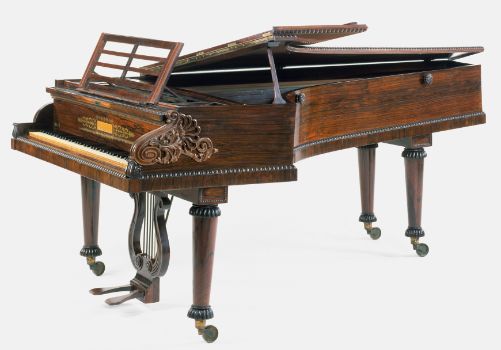
How to Find a Good Piano Tuner?
Finding a good piano tuner can be achieved through personal recommendations, checking online reviews, or consulting professional organizations like the Piano Technicians Guild. Considering the tuner’s training, experience, and reputation is important. Don’t hesitate to ask them questions about their expertise and approach to tuning before deciding.
Tips to Keep a Piano In Tune
- Regular Tunings: Scheduling regular tunings (at least once or twice a year) will help maintain your piano’s pitch and catch any potential issues early.
- Maintain a Stable Environment: Sudden or drastic changes in temperature and humidity can cause the wood in a piano to expand and contract, throwing it out of tune. Try to keep your piano in a room with consistent conditions.
- Avoid Moving the Piano Frequently: The tuning can be affected each time a piano is moved, even within the same room. Keep your piano in one location if possible.
- Use the Piano Regularly: Regular use can help keep a piano in tune, as it helps maintain consistent tension on the strings. However, avoid excessive force, which can cause strain on the strings.
- Professional Maintenance: In addition to regular tunings, periodic professional maintenance can help preserve the piano’s condition and tuning. This includes services like voicing, regulation, and cleaning.
- Install a Climate Control System: If you live in an area with significant climate fluctuation, consider installing a climate control system in your piano to stabilize the humidity level around it.
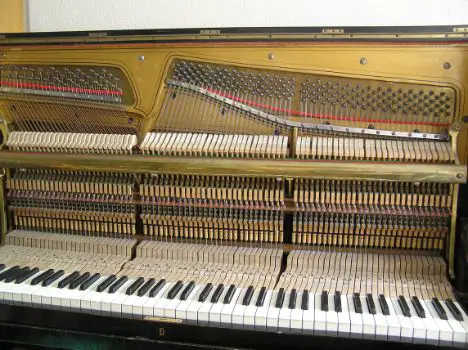
Frequently Asked Questions
Can I DIY tune a piano? Is it a good idea?
While it’s technically possible to tune a piano yourself, it’s generally not recommended unless you have the proper training and tools. Piano tuning requires specific skills and can potentially harm the piano if done incorrectly.
Can a piano be tuned after 20 years?
A piano can be tuned after 20 years, but it may require more extensive tuning or other repairs. Leaving a piano untuned for a long period increases the chance of strings breaking when they are returned.
How often does a piano need tuning?
Generally, tuning a piano at least once or twice a year is recommended. However, pianos that are heavily used or exposed to significant temperature or humidity changes may need more frequent tuning.
How much does it cost to restring a piano?
The cost of restringing a piano can vary widely based on the type and size of the piano, but it generally ranges from $1,500 to $3,500.
Does not tuning damage a piano?
While not directly damaging, neglecting to tune a piano for extended periods can make future tunings more difficult and potentially increase the risk of string breakage.
My piano tuner tunes by ear. Is it okay?
Yes, tuning by ear, or aural tuning, is a traditional method and can achieve excellent results when done by an experienced tuner. Some tuners also use electronic tuning devices as a guide.
How long does it take to tune a piano?
Tuning a piano typically takes one to two hours, but it can be longer if the piano is in poor condition or hasn’t been tuned for a while.
How long does a piano tuning last?
A piano tuning typically lasts about six months to a year, but this can vary based on how much the piano is used and changes in temperature and humidity.
How long should a piano acclimate before tuning?
After a piano is moved, especially to a new climate, it should ideally be given 2-4 weeks to acclimate to its new environment before being tuned.
Do I need to tune a piano after moving?
Yes, moving a piano can often cause it to go out of tune. Let the piano acclimate to its new environment for a few weeks, then have it tuned.